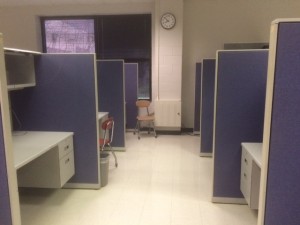Time and time again I hear my peers talking about what they want to do with their life. It’s natural–we’re in high school and we’re forced to think about our futures. Within these discussions there is one recurring theme: Nobody wants to end up in a ‘dead-end office job.’ Jokes like the one seen on this Buzzfeed post complain about the negative effects of starting at a job. But I think it’s time to rethink the concept of the office.
As students make their way into University and beyond, it is inevitable that they will come to realize the likelihood that they’ll end up at a desk job. Even high schoolers have made plans to major in business, having been told by their parents that its the most marketable major. Because in the end, a lot of people are just looking for secure employment.
USA Today’s top ten list of most popular majors puts Business Administration and Management at the top spot. Business is the most popular among several Liberal Arts majors including History, English, and Law. It no secret that people want to study majors that directly contribute to art and creativity, but the security and promise of business still comes out on top.
Because of its ‘popularity,’ it is time, now more than ever, to take another look at business and the main setbacks people have of sitting an office job.
It’s important to consider the possibility of travel when working for a big business. Our world has become extremely well connected; increasing the amount of international travel for big-corporation employees. It seems that the excitement of travel wears off quickly for business frequent flyers. Not to mention the possibility of rental cars mix-ups and flight cancellations as the competition and the quality of airlines has decreased. However, a New York Times article from 2010 has stressed how frequent flyers have never been so equipped for the challenge. Our ability to find hotels and make reservations, as well as contact airlines and change flights, has eliminated some of the worse stressors of flying. And it will only get better as airlines have begun to recognize the importance of corporate business, putting more effort into the treatment of their business flyers in comparison to economy class passengers.
For those who are expected to stay behind, consider rethinking the office space. And more specifically, the cubicle. Tom Schuler, a global marketing leader for the German-based company Bayer, has recently experienced an office change from individual offices to cubicles.
At first, he admits that he had some concerns.
“I haven’t had to share an office with anybody since I was in graduate school. Which was before my career barely even started. Would I be able to focus? Would I be able to study? Would it be too intrusive? What did it mean to share a lot of space with people very close by?” said Schuler.
But over time, the concept grew on him. Although you can’t ever expect any job to be like it is on TV, the community built due to the cubicles resembles something similar to popular TV shows like the Office as people are forced to work together and tolerate each other on a more intimate level.
“For my personality type, I think I was pleasantly surprised. I like the dynamic, I liked the other colleagues that are there, I like being able to have discussion with other people spontaneously and reach out.”
But he made a point of saying that the experience is different for everyone. Factors such as your personality type and the kind of people you work with can have a major effect on your office experience.
“I think it really comes back to whether [you’re] an extrovert or an introvert. Some people [lean] towards being introverted; they need to be able to break away and have quiet time on their own to recharge and wind down and feel comfortable. Whereas other people, who are more extroverted, are more inclined to be around other people to get recharged and get new energy.”
Either way, it is important to re-examine the cubicle and what it means to work in an open space.
After reconsidering two of the major concerns people have with business jobs, acknowledge the genuine benefits of working for a big corporation. Several offer forms of discounted health care, as well as a retirement plans and legitimate pay raises. And as we have seen by the majority of people already going into business, people like the concept of security and the likelihood that they’ll find a job.
And if all else fails, the average person changes jobs between ten to fifteen times in their lifetime, nothing is ever final.

Leave a Reply